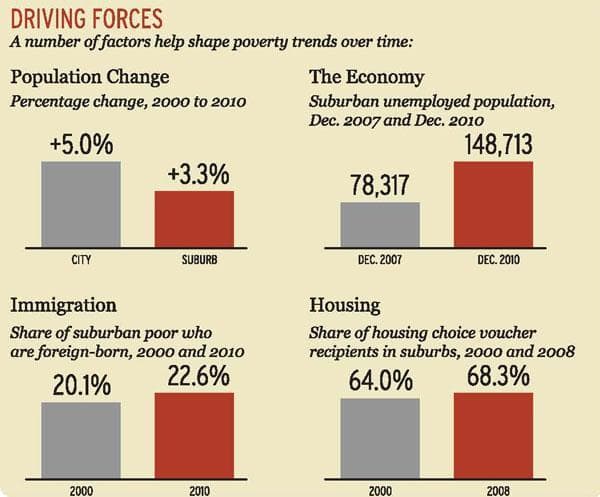Advertisement
In Metro Boston, A Spike In Suburban Poverty
The word "suburb" conjures images of cul-de-sacs and late-model sedans.
But a new Brookings Institution book by Elizabeth Kneebone and Alan Berube, "Confronting Suburban Poverty in America," suggests that picture is incomplete.
Between 2000 and 2011, the tome notes, the number of poor people living in the suburbs jumped 64 percent. That's more than double the 29 percent increase in American cities in the same period.
The result is this rather stunning statistic: there are now more poor people in the suburbs (16.4 million) than in American cities (13.4 million).
The Brookings study chalks up the explosion in suburban poverty to a number of factors.
- Population growth in the suburbs has outpaced urban growth in recent years. With more people comes more poverty.
- Immigration has played a small role. The foreign-born accounted for 30 percent of the suburban population growth in the 2000s, though only 17 percent of the growth in the suburban poor.
- More affordable housing became available in the suburbs in the 2000s, drawing more poor people.
- The recession hit suburban-centered industries like manufacturing, construction and retail hard.
These forces had uneven impacts around the country. In metro Boston, for instance, urban population growth actually outpaced suburban growth over the last decade. But the other three macro trends held in the area:

Suburban poverty rates vary widely across the country. And metro Boston is on the lower range of the scale — its 8.6 percent rate is well below the nationwide high of 36.4 percent, in El Paso, Texas.
Still, the area has seen a far more significant jump in suburban than urban poverty in recent decades.

What does it all mean?
Kneebone and Berube, authors of the Brookings book, suggest the country hasn't yet adapted to the shifting geography of poverty.
Social services are spread thin in the suburbs. And public transportation, which can connect people to jobs, is much spottier.
In the coming years, they argue, policymakers will have to start thinking of poverty as a regional, rather than an urban problem.
This program aired on May 24, 2013. The audio for this program is not available.